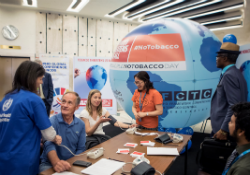World Health Assembly Day 7: global action plan on response to dementia agreed

WHO/L. Cipriani
On 29 May 2017, delegates agreed on a global action plan to ensure that work to address dementia is prioritized. In 2015, dementia affected 47 million people worldwide. This is set to increase to 75 million in 2030. The action plan requires Member States to develop, strengthen and implement policies for dementia; respect the equity, dignity and human rights of people with the disease; and support the needs of carers.
Highlights for the WHO European Region
Committee B: Preparation for the 3rd High-level Meeting of the General Assembly on the Prevention and Control of Noncommunicable Diseases
Many countries reiterated the importance of strengthening work on addressing noncommunicable diseases (NCDs). Speaking on behalf of the Nordic and Baltic countries, Norway expressed its support for the establishment of an expert committee on alcohol control for the High-level Meeting in 2018.
Monaco stressed that the issue of NCDs is complex and universal, and a priority for the 2030 Agenda for Sustainable Development. Azerbaijan outlined its national strategy on the prevention and control of NCDs by 2020, which is being implemented through legislation, the promotion of lifestyle changes and integrated medical services at all levels, from primary health care to rehabilitation.
Committee B: Global action plan on the public health response to dementia
Dementia is an umbrella term for several diseases that are mostly progressive, affect memory, other cognitive abilities and behaviour, and interfere significantly with a person’s ability to maintain the activities of daily life. In 2015, dementia affected 47 million people worldwide (or roughly 5% of the world’s elderly population), a figure that is predicted to increase to 75 million in 2030.
A draft global action plan on the public health response to dementia was developed by the Secretariat at the request of the Executive Board in June 2016. During Committee B discussions, many European Member States expressed their support for the action plan. Speaking on behalf of the European Union, Malta underlined the need to shift from a medical approach to dementia to a human rights approach in order to counteract stigmatization and overmedication, and to encourage care in the community. For this, intersectoral collaboration is essential. The Russian Federation emphasized the importance of pooling Member States’ experiences, and of increasing professional knowledge and research about dementia. Azerbaijan and Norway made reference to their own national plans that are aligned with the global plan.
The plan covers action and global targets in 7 areas: dementia as a public health priority; dementia awareness and friendliness; dementia risk reduction; dementia diagnosis, treatment, care and support; support for dementia carers; information systems for dementia; and dementia-related research and innovation.
To ensure that dementia is addressed as a public health priority, Member States are tasked with developing, strengthening and implementing policies and plans to address dementia, either separately or within other NCD, mental health, ageing and/or disability plans. These initiatives must respect the equity, dignity and human rights of people with dementia and support the needs of carers, in consultation with people with dementia and other relevant stakeholders.
The Committee adopted the proposed action plan for dementia.
Committee A: Strengthening immunization to achieve the goals of the Global Vaccine Action Plan
In May 2012, the Sixty-fifth World Health Assembly endorsed the Global Vaccine Action Plan (GVAP). The 2016 assessment report from the Strategic Advisory Group of Experts (SAGE) on immunization concluded that progress related to GVAP targets is not on track. On Monday, Member States discussed a resolution to strengthen immunization activities in order to achieve the GVAP goals. Many European Member States expressed their agreement with the SAGE recommendations, underlining the importance of ensuring funding for immunization within the broader context of strong health systems. They supported the draft resolution, which was adopted with amendments.
Committee B: Public health dimension of the world drug problem
According to WHO’s 2015 estimates, psychoactive drug use is responsible for more than 450 000 deaths per year. In February 2017, WHO and the United Nations Office on Drugs and Crime (UNODC) signed a memorandum of understanding to strengthen and expand existing cooperation on the public health dimension of the world drug problem. This placed special emphasis on the implementation of the health-related operational recommendations included in the outcome document of the General Assembly’s special session on the world drug problem in April 2016.
Discussing the issue in Committee B, several European Member States, including Belgium, Malta on behalf of the European Union, and Portugal welcomed the memorandum of understanding between WHO and UNODC. They underlined the need for a human rights approach to the global drug problem. The Committee noted the report and supported the implementation of the operational recommendations.
Committee B: Outcome of the 2nd International Conference on Nutrition
During discussions, Turkey outlined its national policies on nutrition that focus on in-service training of health staff on nutrition, developing dietary guidelines for all age groups, providing nutritional supplements to pregnant women and children, and establishing food standards in schools, among other activities. Norway made reference to the importance of sustainable fisheries to achieving the Sustainable Development Goals and meeting healthy nutritional needs. France was one of several European Member States to welcome the work of WHO and the Food and Agriculture Organization on the Rome Declaration. It also praised the European Strategy on nutrition. The Russian Federation described several of its nutrition-related initiatives, and pointed out that food safety and nutritional value are subject to extensive research. Together with countries of central and eastern Europe, the Russian Federation undertakes national interdisciplinary work on nutrition for children up to 3 years of age.



